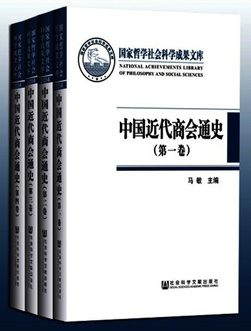
. > WHAT'S NEW > BOOKS
Chambers of commerce played a role in social change
Author : LIANG YANLING Source : Chinese Social Sciences Today 2020-09-11

The History of Chambers of Commerce in Modern China (1902–1953)
In modern times, the chamber of commerce, as an organization for merchants and an intermediary in the market, has played an important role in domestic and international economic arenas. Since the 1980s, the history of the chambers of commerce has become a new research field and object that attracted attention from academic circles in China. With the efforts of several generations of scholars, the field has become a hot topic in modern Chinese history at home and abroad. It has deepened research on economic history, social history and urban history, especially the history of modernization and the bourgeoisie.
Edited by Ma Min, director and a professor of the Institute of Modern Chinese History at Central China Normal University, The History of Chambers of Commerce in Modern China (1902–1953) is a landmark work and has high value in the disciplinary construction of the history of chambers of commerce.
The book is divided into four volumes in chronological order: late Qing (1902–1911) era, early Republican era (1912–1927), the era of the Nanking national government (1928– 1937), and the period (1938–1953) spanning from the War of Resistance Against Japanese Aggression to the early days of the People’s Republic of China.
The definition of chambers of commerce is a concern for the academic community. The book clearly clarifies that a chamber of commerce is neither an official nor semi-official organization, nor is it a “government-supervised and merchant-managed” association, but a merchant-operated corporate legal person.
The book points out the transition of the Chinese bourgeoisie from a “self-being” class to a “self-making” class. The emergence of chambers of commerce allowed the bourgeoisie to form a true regional alliance, and to participate in and initiate regional and even national economic and political activities in the form of organizations. In particular, the establishment of the All-China Federation of Chambers of Commerce in 1912 formed a leadership center of the Chinese bourgeoisie and made it possible for this group to initiate nationwide unified activities.
As a part of non-governmental diplomacy and the main body of civil economic diplomacy, merchant diplomacy is the organized diplomatic activities of merchants, mostly in the form of their chambers of commerce. The book focuses on the role played by the merchant class in the struggle for national economic development, national independence and an equal status in the international community.
The book also explores how the chamber of commerce participated in public administration relating to business affairs and its benign interaction with governments, which promoted the development of capitalism and accelerated industrialization in China.
Liang Yanling is vice president of Social Sciences Academic Press(China).
Ye Shengtao made Chinese fairy tales from a wilderness
Ye Shengtao (1894–1988) created the first collection of fairy tales in the history of Chinese children’s literature...
-
How northern ethnicities integrated into Chinese nation
2023-09-18
-
Mogao caves
2023-09-12
-
Mogao Grottoes as ‘a place of pilgrimage’
2023-09-12
-
Time-honored architectural traditions in China
2023-08-29
-
Disentangling the civilizational evolution of China
2023-08-28
-
AI ethics in science fiction
2023-08-23













 2011-2013 by www.cssn.cn. All Rights Reserved
2011-2013 by www.cssn.cn. All Rights Reserved